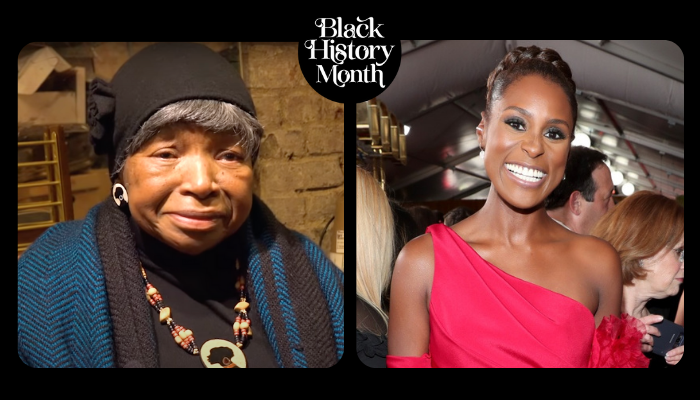Black Behind The Lens: On How Madeline Anderson Paved The Way For Issa Rae & Others

Source: BreAnna Holmes / Radio One Digital
The evolution of Black women in television has become synonymous with victory. From Oprah Winfrey’s transformation from talk show host to singular name maven to Shonda Rhimes’ dominance and control of ABC’s Thursday night lineup and Issa Rae’s ascent from YouTube to HBO and film, and a bevy of content creators like Robin Thede, Quinta Brunson, Michaela Coel, Natasha Rothwell, Tracy Oliver, Yvette Nicole Brown, Lena Waithe and more. Creating content speaking directly to Black women and America at-large aligns with the concept of prestige TV.
Black voices being centered on television may feel like a novel concept but it isn’t. NBC set the standard in the 1980s with The Cosby Show, followed by A Different World and The Fresh Prince Of Bel-Air. FOX countered NBC’s success with a nighttime programming block in the 1990s, producing hit shows such as Living Single, Martin, In Living Color, Roc and more, all of which featured Black women in strong roles regarding friendship, success in the business world, education and more. Although shows waxed and waned over different networks, the conversation constantly swirled around the number of Black shows and their variety. However, shows with Black women not only as leads in front of the camera but behind it all point back to Madeline Anderson.
Anderson, a native of Lancaster, Pennsylvania, went to the theater as a child and noticed the stories being told on screen didn’t reflect hers.
“They were always conquered. They were always dumber than everybody else,” she said. “I wanted to dispel that myth about us,” she said in a 2016 interview. “What I’m proudest of in my career is that I was able to do what I envisioned myself doing. I wanted to tell and teach African Americans what their history was. Not just ancient history, but current history, to inspire pride in who we were and are.”
Anderson would set forth a path previously unseen by Black women in film. She would earn a degree in psychology from New York University and under the tutelage of filmmaker Richard Leacock, would learn how to produce, edit and direct films. Integration Report 1, which was released in 1960, examined the struggle for black equality in Alabama, Brooklyn and Washington, D.C. at the time. It also made Anderson the first Black woman to produce and direct a televised documentary. She would repeat the feat in 1967 with her film, A Tribute To Malcolm X and her vaunted 1970 film, I Am Somebody, a glimpse into the fight 400 Black nurses had at one Charleston, South Carolina hospital to unionize for better wages.
“My willed desire to make films was to educate Black people with their achievements so that we could be proud and not be depicted as clowns and funny people.” – Anderson; 2017
Anderson’s work didn’t only come in producing documentaries. She served as the first female supervising editor and producer of the film department for Children’s Television Workshop, the team behind PBS’ beloved Sesame Street program. Her work was recognized by The Black FIlmmakers Hall of Fame where she was part of their 1993 induction class. In 2015, Integration Report One was accepted into the National Museum of African American Culture in Washington D.C. and in 2019, The Library of Congress selected I Am Somebody for film preservation in the National Film Registry. The cultural significance of Anderson’s work translated from her desire to see more of Black people as entertainers and more as individuals deserving their humanity to be embraced and understood.
Anderson’s poise and grace would inspire the likes of Ava DuVernay, whose 2016 film 13th about the prison industrial complex and its ramifications on modern American life was nominated for an Academy Award for Best Documentary, making her the first Black woman to achieve the feat.
“I believe in fortification and I believe that at this time, we should be fortifying ourselves through knowledge, through self-care, through community,” DuVernay told The Atlantic in 2016. “All of these speak through art. It’s really about rallying around this moment and taking in a totality of what it is, and making it internal in whatever way that means to you.”
DuVernay’s outlook on creativity and the amplification of Black art arrived around the same time Issa Rae began to own Sunday nights on HBO. At the beginning of the 2010s, Rae, a Los Angeles native, utilized her knowledge and love of film and television to direct music videos, plays and more while at Stanford University. In 2011, she launched her YouTube series, Awkward Black Girl, to wide acclaim, helping usher in an era of filmmaking where creators would craft short series for YouTube and other streaming platforms and circumvent having to pitch to major networks.
The honest approach to Awkward Black Girl echoed similar sentiments Anderson had regarding storytelling.
“I had to see an article asking the question about representation to get started, to light fire up under my ass, stop making excuses and finally just hit up, like, my best friend and my homie to do it, and to shoot it, and at least put it out there,” she told HuffPost in 2021 about the origins of the series. “But I definitely didn’t have a plan. It was just, like, I have access to my dad’s clinic. I can shoot some scenes there. I had my own apartment, and I have a car and let’s see where that goes.”
Rae’s popularity with Awkward Black Girl led her and noted television show host, writer and producer Larry Wilmore to shop Insecure. The show, highlighting the lives of a group of Black Angelinos navigating love, career, ambition and more, became not only a cult classic on HBO, it dominated social media routinely on Sunday nights and changed the lives of everyone involved.
“This was always a series about a girl who’s trying to figure out who she is and where she’s going,” Rae told the Los Angeles Times following the end of Insecure in December 2021. “And Prentice [Penny] and I always discussed that this would be a journey of being secure in your insecurities and comfortable with not knowing what’s going to happen, comfortable with the uncomfortable. I think Issa has reached that point. Some of the literal circumstances may be the same, but she has evolved so much, and that’s where I wanted her to end up.”
Rae’s finding her footing as a producer and creator has led her to sign a five-year multi-project deal with HBO’s parent company, Warner and continue to set the path Anderson paved: authentically telling Black stories in spaces where they needed to be seen and heard.


